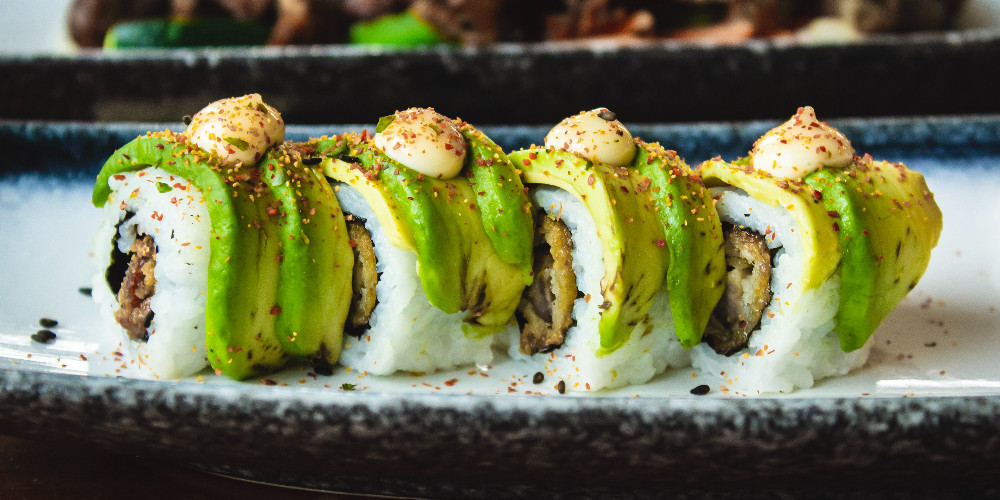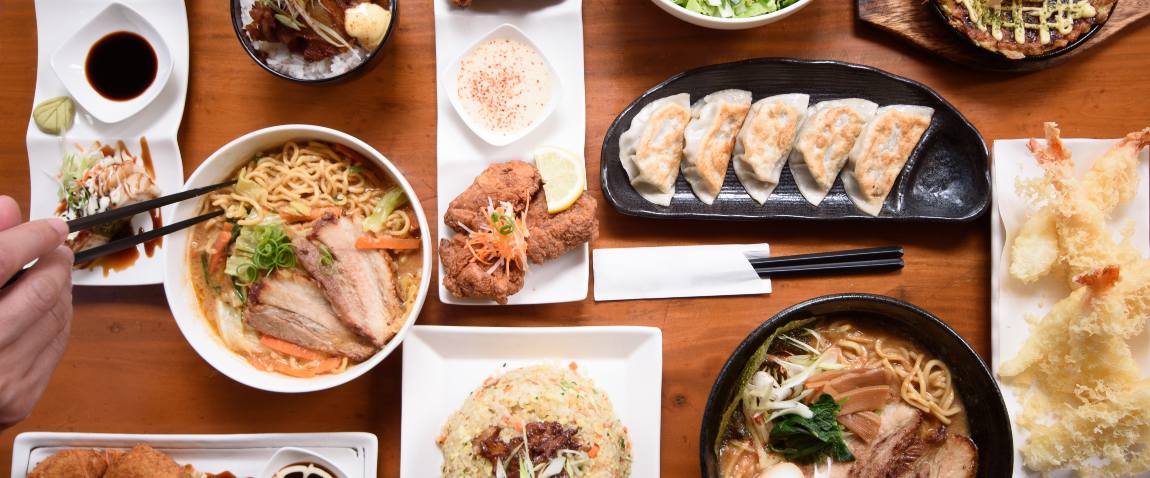
With its ultra-famous flagman, sushi, Japanese cuisine has entered the hearts and homes of people worldwide. The interest in their complex but utterly delicious flavors that combine freshness and delicate taste notes has been growing exponentially ever since. So much so that Japanese cuisine has made it on the UNESCO Intangible Heritage List in 2013, and since 2011 maintained the title of the country with the most 3-star Michelin restaurants in the world. A coincidence? I don’t think so!
Nowadays, surely most will recognize such names as sushi and ramen, but one country would not be able to reach and sustain such popularity among gourmands based on two delicious items like these. The long-lasting gastronomic history, great respect for the produce, and influences from complex cuisines like Chinese have made it way more diverse and likable by taste buds worldwide. If you are not well familiar with what are best Japanese foods to try, then this article will be an educative eye-opener for you. It is why I will write about what are some traditional Japanese food you need to try while you travel to Japan. But first, to realize this much-wanted trip, find out if you need a Japan visa or not. And each of the top 10 Japanese foods you have to try will serve a purpose in the grander scheme of understanding the country’s map of yummy. So hold tight and maybe prepare a sandwich in case you get hungry while reading about all of this mouthwatering stuff! Let’s start with the basics.
What are the main characteristics of Japanese cuisine?

Understanding what are best Japanese foods to try has to start with a deeper understanding of their food philosophy and elements, too. Just as anywhere in the world, the most traditional aspects of cuisine have developed over centuries and gained influences from other, external cultures. As I mentioned already, China and Western countries have immensely affected how people eat in Japan nowadays.
Nonetheless, the old-school tradition of Japanese cooking is named in the UNESCO list of Intangible Heritage. It is usually referred to as “Washoku” ( 和食 ), which literally means a combination of two symbols: “Japan” or “harmony” and “food” or “to eat”. It also implies that it is a harmoniously crafted meal that beautifully blends nutritious ingredients.
In the next paragraphs, you will hear a more detailed description of dishes, but before we move forward, I want to explain the basic pillars of Japanese foods to try. The food that Japanese people are used to heavily relies on rice, fermented soybean products (like miso and soy sauce), as well as distinctively seasonal produce. Fish and seafood are common, eaten grilled or raw. Pickled vegetables, foods deep-fried in a light batter called tempura, and various types of noodles are other common staples that make up many of their plates daily. So let’s get to the interesting part!
Here are the top 10 Japanese foods you have to try, and why!
So here, you will see a list of foods that are my favorite, but there is one thing you should keep in mind while scrolling through those. Some of them are just a traditional technique of cooking or serving, but some are just very typical ingredients that can be prepared in different ways. Also, in no way was I aiming at displaying the very traditional and old-school dishes! Let’s cut to the chase.
1. Sushi

Okay, there is nothing innovative about this position on the list because any list about Japanese food will feature sushi, but I hope you get it; there is no way I could leave this unmentioned. The art of making sushi is that - an art that has to be developed by meticulous work for decades. Eating sushi made by a true master will be an experience that will transport you to another dimension as it is the epitome of Japanese philosophy around food. All the respect towards elders, the quality of products, and craftsmanship pressed into a bite-size piece of freshly prepared local flavour. Even though this will be a pricey move, sushi is definitely one of the Japanese foods to try in Tokyo. There, you will come across the most variety of places and, therefore, the ability to choose your appropriate price range.
2. Shabu-shabu

It is one of the dishes which I described before. It is a technique of serving and eating food, thin slices of marbled pork or beef served raw alongside a pot of sizzling broth right on the table. And the fun part starts here - the person eating would wrap the pieces of meat around chopsticks and dip in the hot liquid, quickly cooking for consumption right then and there. If you have ever heard about the pristine Wagyu beef, then among other Japanese foods to try in Kyoto.
3. All noodles - soba, udon, and of course, ramen

This list won’t be complete without the concept of a noodle slathered in a hearty broth. I mentioned all three types of noodles differ in shape and ingredients, but the outcome is usually very similar. A big bowl of hot soup that makes your heart happy!
4. Kaiseki

Yet another concept that isn’t necessarily a dish per se. It originated around the same time as the tea ceremony and is a part of Japanese haute cuisine. Meticulously arranged and beautifully decorated small dishes of fresh foods that underline the current season are served in a particular order. Some call it a work of art! And since it originated there, it is one of the Japanese foods to try in Kyoto.
5. Unagi

One of the most prominent ingredients of Japanese cuisine is the river eel. Traditionally grilled and smeared with barbeque sauce, it is one of the things Japanese folklore assigns a lot of meaning to.
6. Okonomiyaki

It is another fun type of food - a light batter is fried in front of your eyes together with an array of your favorite ingredients. A type of pancake with all the goodies, mayonnaise, and bento flakes, if you may say. Especially fun enjoyed and experienced in groups - with your friends and family!
7. Kushiyaki and Yakitori

There is something universally enjoyable about grilled meats. And this is why Kushiyaki has made it on the list too! Kushiyaki is different grilled and skewered foods. Yakitori is the most popular one, and usually means chicken pieces on a specific type of skewer. Informally, many call all the Kushiyaki this name. Even though that might sound slightly odd, I dearly suggest opting for chicken hearts or livers on a stick. Unexpectedly, but undoubtedly among the best Japanese foods to try!
8. Gyoza

It is one of my favourite foods to try in Japan. Mouthwatering Japanese dumplings or potstickers that are served on their own or with a bowl of delicious broth. There is something unbelievably satisfying about wrapping meat or vegetables in a thin film of dough and then frying it off!
9. Mochi

I couldn’t make this list of top 10 Japanese foods to try without ever mentioning at least a few desserts. The first of two is mochi, a small bouncy cake made from special glutinous rice, colored in all the possible shades, made into the most unimaginable shapes. Usually shaped like small balls, though, these particular sweets are one of the most distinctive pieces of food you will encounter in the world, so it happens to be one of the Japanese foods to try.
10. Japanese cheesecake

Another type of Japanese foods to try in Tokyo will feed any serious sweet tooth. It is a particular Japanese cheesecake that differs from the ones we are used to with its airiness and the famous jiggly texture. Simply yum!
Okay, let’s wrap this up. It is obvious why so many people have found themselves liking and craving the delicious cuisine of Japan. Some of the best Japanese foods to try will appeal to an eater with a sophisticated sense of taste, but some - to a tongue willing to experience a more hearty and homelike deliciousness. And don’t forget everyone is looking forward to eating meals that are good for your body and soul! The truth is that most Japanese foods to try in Japan and outside of it are simply tasty, and the cuisine is diverse enough to cater to the needs of all types of eaters.
So which were your favorite dishes on this list of top 10 Japanese foods to try? I hope that the information here was enough for you to get a slight hunger, a bit of curiosity, and a lot of insight into what Japanese cuisine is all about. Just enough to want to visit and try it all through your own senses! Or at least to visit the closest restaurant and get a sense of what I am talking about before booking a gourmet trip to the land of the rising sun. Bon appetit!


